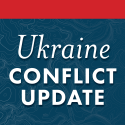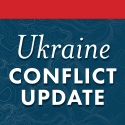RUSSIAN OFFENSIVE CAMPAIGN ASSESSMENT, MARCH 26
Mar 26, 2022 - ISW Press
Russian forces continued their unsuccessful efforts to move into positions from which to attack or encircle Kyiv, claims by First Deputy Chief of the Russian General Staff Sergei Rudskoi on March 25 notwithstanding. The Russian military continues to concentrate replacements and reinforcements in Belarus and Russia north of Kyiv, to fight for positions on Kyiv’s outskirts, and to attempt to complete the encirclement and reduction of Chernihiv. Russian activities around Kyiv show no change in the Russian high command’s prioritization of the fight around Ukraine’s capital, which continues to occupy the largest single concentration of Russian ground forces in Ukraine. The Russians have not claimed to redeploy forces from Kyiv or any other part of Ukraine to concentrate on fighting in Donbas, and we have observed numerous indicators that they have not done so. The increasingly static nature of the fighting around Kyiv reflects the incapacity of Russian forces rather than any shift in Russian objectives or efforts at this time.










